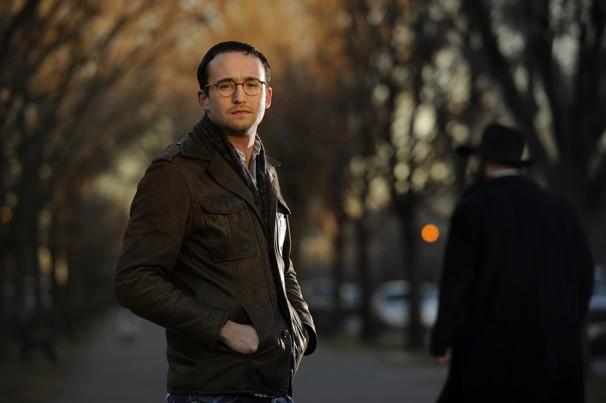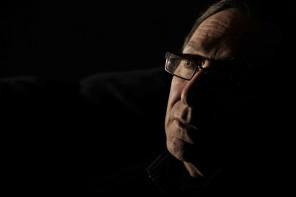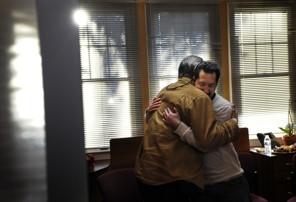'Standing Silent' Follows Uncovering of Sexual Abuse in Baltimore's Orthodox Jewish Community
Washington Post
One by one the victims stood and described their alleged molesters: the Torah teacher, the rabbi, the ice cream truck driver, the man at the mikvah. That meeting, held nearly six years ago in a small room in a synagogue in Pikesville, just outside Baltimore, went on for four hours. Seated in a circle with the other victims was Phil Jacobs, a Baltimore Jewish Times journalist. He was not there as a reporter. He was there because he, too, had experienced sexual abuse. But after the meeting, a young man who knew Jacobs was a journalist approached and asked to be interviewed, to have his story told. That was the beginning of Jacobs's effort to document sexual abuse in Baltimore's Orthodox Jewish community, bringing the harrowing experiences shared by the 18 victims in that room out into the open. The first of his stories, "Today, Steve is 25" was published in February 2007, 10 months after the Pikesville meeting. That process of reporting and writing has been made into a documentary film, "Standing Silent," directed by Scott Rosenfelt and now being shown at film festivals across the country. Partially funded by a Sundance Institute grant, it details how Jacobs, an Orthodox Jew himself, has been credited with — and criticized for — uncovering a painful secret in Baltimore's Orthodox community. "I saw a narrative character that was in great conflict between protecting his faith and his community and protecting children and humanity," says Rosenfelt, who is an established producer ("Home Alone," "Mystic Pizza") as well as a family friend of Jacobs. "To me it was bigger than an action film. Phil's journey is a classic hero's journey — it has all the makings of a great movie." "Standing Silent" was filmed between 2007 and 2010, with a three-person crew that traveled with Jacobs through Baltimore's suburbs and to Israel, eventually recording more than 125 hours of video, much of it interviews with victims and alleged perpetrators. The story took over Jacobs's career in a way that surprised him. Tall and lanky with a softspoken manner, Jacobs, 58, still lives in Baltimore and is still married to his high school sweetheart. The Baltimore native and University of Maryland alumnus had worked for the Jewish Times company for 30 years, and while he "never wanted to cover Bubbie and Zaidy at the Gefilte Fish Ball," he says from his new Rockville office at Washington Jewish Week, where he became editor in chief last summer, "I also didn't expect this." "Standing Silent" depicts a community struggling to come to terms with a problem that, Jacobs says, has remained underreported for years and seems only recently to have attracted the attention of advocates and lawmakers. There are no hard numbers to document the extent of the problem, but Elaine Witman, director of the Shofar Coalition, a nonprofit agency that provides services for victims of sexual and other abuse in the Baltimore area's Jewish community, says the center is seeing an increase in the number of Jews coming forward to report abuse. In 2010, 67 people requested help for childhood sexual abuse from the coalition. That number nearly doubled in 2011, to 132 people, said Witman, who attributes the increase to Jacobs's articles and the coalition's efforts toreduce the shame that has kept the issue quiet for so long. Jacobs says he was haunted by the abuse he says he suffered as a child but that "it was 1967 and no one talked about things like that, and I didn't have the words to describe it." There are also cultural reasons for silence, stemming at least in part from a Jewish law known as "mesirah," which forbids informing on a fellow Jew to secular authorities. The law is integral to a culture of self-protection rooted in centuries of anti-Semitism, according to Rabbi Yosef Blau, spiritual adviser of Yeshiva University in New York. Reporting sexual abuse first to a rabbi is the recommended protocol of Agudath Israel of America, a national Orthodox umbrella group with an affiliated synagogue in Pikesville. The organization — whose influence in some Orthodox communities is similar to that of the Vatican among some Catholics, Blau says — issues opinions on policy matters. Blau, whose efforts to hold the community accountable for sexual abuse are highlighted in the documentary, says the protocol endangers children. He draws a parallel with the Roman Catholic Church, where a pervasive culture of silence and denial made clergy unlikely to pass abuse accusations along to police. "Why go to a rabbi? Are these rabbis qualified? Do you call the police if you want to find out if food is kosher?" said Blau. "The problem is the community doesn't want to bring a shame on Orthodox Judaism if these crimes get reported. But I would argue that we have an obligation to protect our children first." The documentary's release comes as elected officials across the country are pushing for tougher reporting laws, partly in response to allegations of abuse in another tight-knit community — the football program at Penn State. Sen. Robert P. Casey Jr. (D-Pa.) has introduced a bill that would withhold federal funds from states that fail to enact laws requiring all adults to report abuse to police. Maryland state Sen. Nancy Jacobs, (R-Harford) introduced a bill recently that could make failing to report sexual abuse a crime punishable by a $1,000 fine and a year in jail. And in New York, State Assemblywoman Margaret Markey is promoting a bill that would extend the statute of limitations for sexual abuse victims, both for criminal prosecution and civil lawsuits. Speaking out What emerges most clearly from "Standing Silent" are the costs of failing to report abuse, told largely through the experience of the man who organized the original Pikesville meeting that Jacobs attended, Yacov Margolese. You only need to hear Margolese's story, Jacobs explains, to understand how corrosive keeping quiet can be. These days, though, Margolese tells it more openly. The oldest of nine children, Margolese moved to the Baltimore suburb in 1987 from Far Rockaway in Queens. He remembers as a 13-year-old wanting to increase his level of religious observance, to learn the skills required to sing the Torah like so many of his new neighbors had. So, Margolese says, his parents hired Israel Shapiro, a burly, jovial man known for having a way with children, as a Torah tutor. Margolese alleges that Shapiro soon began fondling him during the lessons. Margolese says he told a rabbi about the abuse and that the rabbi advised him to tell Shapiro he wanted to focus on his studies. He did so, but the abuse continued, he said, and after a few months, he told his parents he had learned enough. For years afterward, Margolese says, he suffered from suicidal depression. He felt like he needed to cleanse himself, become more religious. "But as I grew up, I couldn't reconcile the hypocrisy," Margolese says. "To me, it wasn't just sexual abuse," Margolese says in "Standing Silent." "It was spiritual abuse." He survived, but his faith did not. After the Sept. 11, 2001, attacks, Margolese joined the Army and was posted to Baghdad. When he came home in 2004, he started a construction business with his brother. His efforts to talk about his abuse were almost always met with denial by family and community members, he says. "It's like a victim was standing in front of them covered in blood and wounds," he said. "They would say, 'Don't worry, you'll be fine.' " It wasn't until 2007 that Margolese — galvanized by the out-of-state arrest of a former member of Baltimore's Orthodox Jewish community for child sexual abuse — reported Shapiro's actions to the police and convened the Pikesville meeting. "It was the beginning of an awakening in Baltimore," Margolese says. After it became known that he had gone to the police, Margolese says, members of Baltimore's Orthodox community urged him to drop the matter — "Stop your crusade to destroy people and leave it," he remembers one person said. His father, Mordecai Zev Margolese, 61, said his son received anonymous death threats over the telephone. In March 2008, Shapiro received a five-year suspended sentence after filing an Alford plea, which means the defendant does not admit guilt but acknowledges that the prosecution has enough evidence to convict him. Shapiro's name is now on the Maryland Sex Offender Registry. He works at a kosher butcher shop in Pikesville and declined to comment for this story. Recently, Yacov's father watched "Standing Silent" at a Shofar Coalition screening. "When he told me about his sexual abuse, I didn't react to Yacov at all. I thought he was making mountains out of molehills," said Mordecai Zev Margolese. "The film really opened my eyes. I really cried a lot. Now, at least, he's standing up for what he believes, and I'm proud of him. It takes a lot of guts." 'A lonely voice' After the publication of "Today, Steve is 25," Jacobs says his phone suddenly became the "hotline for victims of molestation in the Orthodox Jewish community." He was especially shocked to receive half a dozen calls accusing Rabbi Jacob Max, the man who had officiated at his wedding, of molesting women. (In April 2009, Max, 85, was convicted of sexually molesting a 44-year-old woman. He was sentenced to one year of incarceration, which was suspended, and one year of court-ordered unsupervised probation; he died in August.) One scene in the documentary captures Jacobs immediately before calling Rabbi Max to ask about the allegations. "I'm very nervous. I'm throw-up nervous," Jacobs says to his editor, adding, "If this was easy, I would be very worried about myself." Criticism of Jacobs intensified when he began writing stories about three men who said they had been sexually abused by a religious figure, a deceased member of Baltimore's Orthodox Jewish community. "The Orthodox community was thunderstruck by the suggestion that people who we entrust in such religious bastions could do this," said Rabbi Emeritus Chaim Landau, with the Ner Tamid Congregation in Pikesville. "People felt the [Jewish Times] was exposing dirty laundry." Calls and e-mails from victims kept coming, and Jacobs felt compelled to keep investigating reports of abuse. "I didn't go looking for them," he said. "They kept coming to me." Many people accused him of lashon hora, the Hebrew term for negative speech that harms another, and that is considered a sin. He was criticized on Web sites and received hate mail, with one blogger even writing that he hoped Jacobs's two daughters would be barren. Rabbi Moshe Heinemann, head of Star-K, a Baltimore kosher certifying agency, who also works with the Agudath Israel of Baltimore, called for a ban on the Baltimore Jewish Times, posting a letter in his synagogue that read, "It is totally inappropriate for this publication to be found in any Jewish home." Heinemann could not be reached for comment but earlier defended his letter in interviews with victims' groups, saying he felt the paper was "orthodox bashing." "So it was 'Kill the messenger.' I know Phil's is a lonely voice at times, which makes it all the more important that it be heard," said former Baltimore Jewish Times editor Gary Rosenblatt, now editor and publisher of the New York Jewish Week. "Standing Silent" pays tribute to that messenger — and makes sure his message continues to be heard. "There have been a number of documentaries around sex abuse in the Catholic Church, but the thing that stands out about this is that it locates this problem in an entirely different context," said Thom Powers, artistic director at DOC NYC, a New York-based documentary festival. "And I think the filmmakers' closeness to the subject is a big part of the power of this film. What you really see is an unusual level of trust and access and a great deal of sensitivity."
|
.
Any original material on these pages is copyright © BishopAccountability.org 2004. Reproduce freely with attribution.


